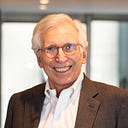Remembering Leslie H. Gelb
Some tributes are worth repeating. Les Gelb died over the weekend at 82. He had an illustrious career in journalism and public service and as President of the Council on Foreign Relations. His friends would agree that for all that, he was singularly memorable for his wit and mastery of irony about life in all its facets. Here is the column I wrote for The Daily Beast when his major work on diplomacy was published a decade ago. It was an excellent book but lunch with Les was much more fun.
Leslie H. Gelb arguably has the most extensive “establishment” credentials of our time. So what he has to say in his new book, Power Rules: How Common Sense Can Rescue American Foreign Policy (HarperCollins), should be of considerable value to those now in command in Washington in the unlikely event they can read and reflect in the midst of myriad crises.
Here, drawn from the biography that accompanied Gelb’s appearance last week at the Council on Foreign Relations, are just some of the items on his resume: He was director of policy planning and arms control for international-security affairs at the Department of Defense from 1967 to 1969, where he also served as director of the Pentagon Papers Project. From 1977 to 1979, he was an assistant secretary of State and director of the Bureau of Politico-Military Affairs. He was a diplomatic and national-security correspondent for the New York Times, where he won a Pulitzer Prize in 1985 and later was a columnist and deputy editorial-page editor. From 1993 to 2003, he was president of the Council on Foreign Relations, a position he held with such dynamism that they kept him around as president emeritus so he could write this book, his magnum opus, which he long wanted to call Foreign Policy Is Baloney before dignity prevailed. And lest you wonder, there is much, much more to the bio.
The meaning of “establishment” has changed from the notion of sober-sided WASP males of the kind that adorn the walls of the CFR’s Rockefeller Room, where Gelb’s portrait also now hangs. Yes, he has a PhD from Harvard, where he studied under Henry Kissinger, but like Kissinger he comes from a Jewish immigrant family. Gelb is the antithesis of stuffy, with a knack for wisecracks, irony and good-natured jibes. He devoted considerable energy in his years at CFR to expanding its membership to include more women, minorities and young people, and substantially increased membership from outside New York and Washington. The current financial upheaval has undermined the standing of many latter-day establishment figures that rose through the ranks of banks and business and are now on their uppers, but a glittering vitae of high-level government service, journalistic punditry, and think-tank eminence still carries very considerable cachet.
Which brings me to the substance of Gelb’s book (in which I am duly acknowledged as a friend and a reader of an earlier draft). This is a book of 300 pages examining power from multiple angles that doesn’t lend itself to bumper-sticker summary. Gelb is a critic of both right and left. He served Jimmy Carter, but then voted for Ronald Reagan. Gelb specifically disputes the simple but memorable axioms in bestsellers such as Joseph Nye’s Soft Power and Thomas Friedman’s The World Is Flat. Gelb’s essential message is that the United States remains unquestionably the world’s most-formidable nation, but the means to support its objectives of global peace, prosperity and democracy are at risk because of what he calls “demons,” defined as “ideology, domestic politics, and the arrogance of power.”
“The demons,” he writes, “ensnare our leaders into thinking about what they ‘must’ do, rather than about what they can do. They create seeming necessities or imperatives that rob us of choice and thus of the essence of our common sense. And common sense should be the basis of our foreign policy. It is, after all, what our leaders usually wind up resorting to after years of policy failures.” Taking examples from recent debacles, Gelb says that “necessity makes victory in Iraq look as easy as the conquest of Panama and transforms centuries of Vietnamese culture and history into a manageable square on the strategic chessboard.” He contends that the United States should see beyond the dogmas and doctrines of anti-terrorism and anti-communism to a clearer sense of national interests and therefore more-realistic strategies for achieving our goal to restrain inimical forces.
This is, of course, the sort of argument that is easier in retrospect than in the extraordinary pressures of the moment when decisions get made and the perception of weakness or wavering is the way to political annihilation. “How people behave in these demon-driven situations determines their reputations and how they will be portrayed — as liberals, wimps, non-team players, loose cannons — [and] these characterizations usually last forever,” Gelb concludes, “People don’t like to talk about this, but it is the constant private lament of Washington’s professionals.”
Gelb is a critic of both right and left. He served Jimmy Carter, but then voted for Ronald Reagan.
That Gelb describes this dilemma from that perspective is significant because it reflects the particular nature of his experience. He is, after all, a quintessential “professional,” with a lifetime spent around mercurial public figures, politicians, cabinet members and moguls, without ever being one himself. That gives him a measure of distance and cover from devising the policies — such as going to war in Iraq — that he believes have gotten the country into such trouble, especially at moments like the aftermath of 9/11, when all the demons of politics and ideology were unleashed. What Gelb has done so well in Power Rules is provide the lessons of a brilliant career of observation, study, and counsel that practitioners with much less experience (Barack Obama most of all) would do well to heed. But when in power, they so rarely have the time.
